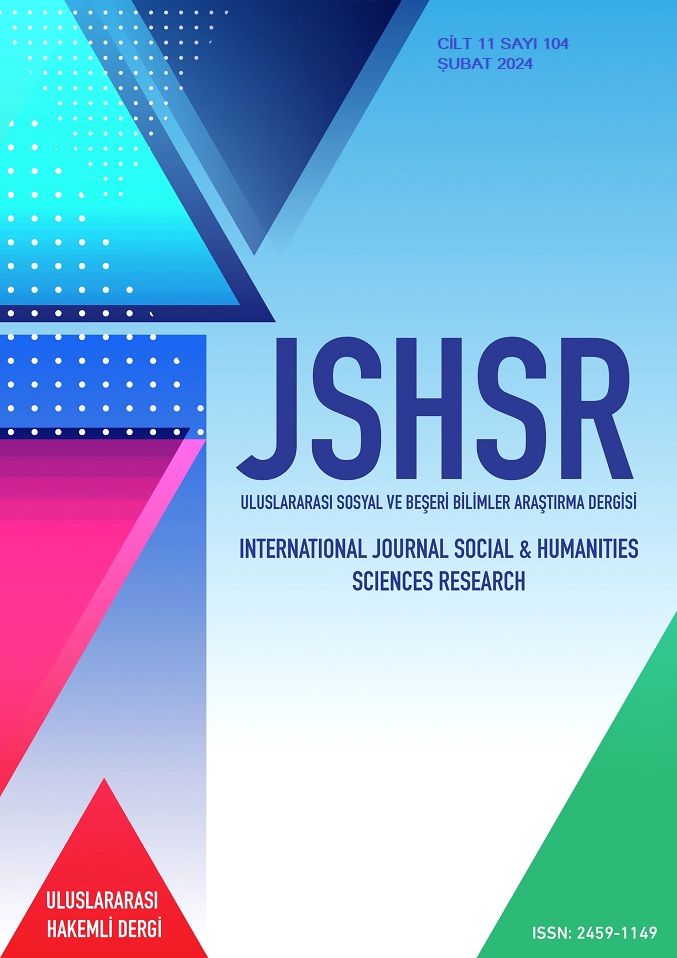Opinions of Classroom Teachers Working in the Earthquake Region Regarding Their Motivation
DOI:
https://doi.org/10.5281/zenodo.10732802Keywords:
Earthquake, Motivation, Classroom teachers, DisasterAbstract
Motivation is very important in professional life as well as in all areas of life. Because the level of enjoyment of a profession/ job directly or indirectly affects production, success and productivity. This study aims to reveal how the motivation perceptions of teachers after the February 6 great earthquake, whether there are situations that motivate teachers in this process, what are the situations that disrupt their motivation in the school environment and what they do to solve them. Case study design, one of the qualitative research designs, was used in the research. The case study design was chosen because it was desired to determine the post-earthquake motivations of classroom teachers working in the earthquake zone with their own discourses. The study group of the research consists of 16 classroom teachers working in the Elbistan district of Kahramanmaraş in the 2023-2024 academic year. The purposive sampling method, which is one of the non-random sampling methods, was used in the study. In this respect, the participants who participated in the study were selected from among the teachers who are still working in the earthquake zone and who have experienced the earthquake in order to select the appropriate sample for the purpose. The data in the study were published in the first half of the 2023-2024 academic year. The data obtained in the study were analyzed by content analysis method. As a result of the research, it was determined that the motivation of the teachers was low after the earthquake, there were psychological factors that negatively affected their motivation in the school environment, and the method of coping against the situations that negatively affected their motivation was to allocate time to their hobbies. In addition, teachers stated that the concept of gratitude is the situation that had a positive effect on their motivation after the earthquake and that the Ministry should support teachers in this process.
References
Ada, Ş., Akan, D., Ayık, A.., Yıldırım, İ., ve Yalçın, S. (2013). Öğretmenlerin motivasyon etkenleri. Atatürk Üniversitesi Sosyal Bilimler Enstitüsü Dergisi, 17(3), 151-166.
Bassey, M. (1999). Case study research in educational settings. Buckingham: Open University Press.
Büyüköztürk, Ş., Kılıç Çakmak, E., Akgün, Ö.E., Karadeniz, Ş. ve Demirel, F. (2019). Bilimsel araştırma yöntemleri. Ankara: Pegem Akademi.
Demir, S. (2018). Okul yöneticilerinin kullandıkları motivasyonel dil ile öğretmen motivasyonunun incelenmesi. [Yayınlanmamış Doktora Tezi]. (503857), Eğitim Bilimleri Enstitüsü, Gaziantep Üniversitesi.
Demiroğlu, İ. H. (2023). Örgütsel Sessizliğin Öğretmen Motivasyonu Üzerine Etkisi. Balkan & Near Eastern Journal of Social Sciences (BNEJSS), 9(2).
Doğan, S., ve Koçak, O. (2014). Okul yöneticilerinin sosyal iletişim becerileri ile öğretmenlerin motivasyon düzeyleri arasındaki ilişki. Kuram ve Uygulamada Egitim Yönetimi Dergisi, 20(2), 191-216.
Ertürk, R. (2016). Öğretmenlerin iş motivasyonları. Eğitim Kuram ve Uygulama Araştırmaları Dergisi, 2(3), 1-15.
Göcen, G. (2012). Şükür ve psikolojik iyi olma arasındaki ilişki üzerine bir alan araştırması. [Yayınlanmamış Doktora Tezi]. (314792), Sosyal Bilimler Enstitüsü, Ankara Üniversitesi.
Gölezlioğlu, Y. N. (2023). Öğretmen motivasyonunu etkileyen veli tutum ve davranışları. [Yayınlanmamış Yüksek Lisans Tezi]. (793817), Eğitim Bilimleri Enstitüsü, Necmettin Erbakan Üniversitesi.
Gülmez, H. & Özdemir, T. (2023). Sınıf öğretmenlerinin mesleki yabancılaşma ve motivasyon düzeyleri arasındaki ilişkinin incelenmesi. Abant İzzet Baysal Üniversitesi Eğitim Fakültesi Dergisi, 23(1), 427-448.
Gümüştaş, Z. ve Gülbahar, B. (2022). Öğretmenlerin mesleki motivasyonunu etkileyen etkenler. Pearson Journal, 7(20), 180–200. https://doi.org/10.46872/pj.538.
Ilgar, Ş. (2004). Motivasyon aktiviteleri ve öğretmen. HAYEF Journal of Education, 1(2), 211-222.
İhtiyaroğlu, N. (2017). Yapısal ve psikolojik güçlendirmenin öğretmen motivasyonu üzerindeki etkisi. Kırıkkale Üniversitesi Sosyal Bilimler Dergisi, 7(2), 361-378.
İşgörür, N. (2020). Okul yöneticilerinin öğretmen motivasyonunu artırmaya yönelik yararlandığı motivasyon araçları. [Yayınlanmamış Yüksek Lisans Tezi]. (635965), Eğitim Bilimleri Enstitüsü, Bahçeşehir Üniversitesi.
Kaya, Y. (2022). Ünivertsite öğrencilerinde bilişsel davranışçı yaklaşım temelli çevrimiçi akademik motivasyon psikoeğitim programının akademik motivasyon ve akademik erteleme üzerindeki etkisi. [Yayınlanmamış Yüksek Lisans Tezi]. (399487), Eğitim Bilimleri Enstitüsü, Akdeniz Üniversitesi.
Keller, M. J. (2010). Motivational design for learning and performance: The ARCS model approach. New York: Springer Publishing.
Kılıç, Y. (2023). Kamu ve özel okul öğretmenlerinin motivasyon düzeylerinin karşılaştırılması. Turkish Journal of Educational Studies, 10(1), 1-22.
Kurt, T. (2005). Herzberg’in çift faktörlü güdüleme kuramının öğretmenlerin motivasyonu açısından çözümlenmesi. Gazi Eğitim Fakültesi Dergisi, 25(1), 285-299.
Merriam, S. B. (2015). Qualitative research: Designing, implementing, and publishing a study. In Handbook of research on scholarly publishing and research methods (pp. 125-140). IGI Global.
Monteiro, V. (2013). Promoting reading motivation by reading together. Reading Psychology, 34(4), 301-335.
Özbey, S. (2018). Okul öncesi dönem çocuklarında motivasyon ve öz düzenleme becerileri üzerine bir inceleme. Akademik Sosyal Araştırmalar Dergisi, 6(65), 26-47.
Scheopner, A. (2010). Irreconcilable differences: Teacher attrition in public and catholic schools. Educational Research Review, 5, 261-277.
Taş, H. (2021). COVID-19 pandemisi sürecinde uygulanan uzaktan eğitimin paydaş görüşleri bağlamında değerlendirilmesi. Eğitim ve Beşeri Bilimler Dergisi, 12(23), 23-49.
Taş, S., ve Korkmaz, İ. (2019). Sınıf Öğretmenlerinin Motivasyonunu Etkileyen Faktörler. Sportive, 2(1), 12-24.
Telli, R., Telli, H., ve Kurt, C. (2023). Okul yöneticilerinin ve öğretmenlerin yaratıcı liderlik ve öğretmenlerin motivasyonu hakkındaki görüşlerinin incelenmesi. Eurasian Academy of Sciences Journal, 49(1), 30-47.
Wentzel, K. R. (1998). Social relationships and motivation in middle school: The role of parents, teachers, and peers. Journal of Educational Psychology, 90(2), 202.
Yakışıklı, A., Yavuz, S., Asmaz, C. B., ve Karagedik, H. (2023). Okul yöneticilerinin liderlil stillerinin öğretmen motivasyonuna etkisi. Ulusal Eğitim Dergisi, 3(5), 864-878.
Yavuz, C., ve Karadeniz, C.B. (2009). Sınıf öğretmenlerinin motivasyonunun iş tatmini üzerine etkisi. Uluslararası Sosyal Araştırmalar Dergisi, 2(9), 507-519.
Yıldırım, A. ve Şimşek, H. (2016). Sosyal bilimlerde nitel araştırma yöntemleri. Ankara: Seçkin Yayıncılık.
Yıldırım, A. ve Şimşek, H. (2018). Sosyal bilimlerde nitel araştırma yöntemleri (11. Baskı). Ankara: Seçkin Yayıncılık.
Yıldız, B., ve Akkoyun, A. Z. (2023). Deprem sonrası psikiyatrik destek. İzmir Katip Çelebi Üniversitesi Sağlık Bilimleri Fakültesi Dergisi, 8(2), 817-820.
Yin, R. K. (2014). Case study research: Designs and methods (5th edition). Los Angelos: Sage.
Downloads
Published
How to Cite
Issue
Section
License
Copyright (c) 2024 INTERNATIONAL JOURNAL OF SOCIAL HUMANITIES SCIENCES RESEARCH

This work is licensed under a Creative Commons Attribution 4.0 International License.


